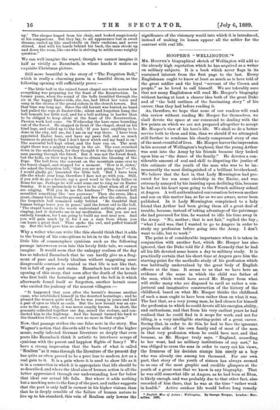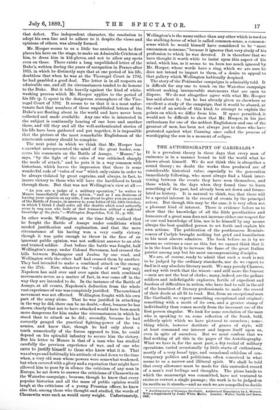HOOPER'S " WELLINGTON."
MR. HOOPER'S biographical sketch of Wellington will add to, the already high reputation which he has acquired as a writer- on military subjects. It is a book which never flags in its sustained interest from the first page to the 'last Every Englishman ought to know at least as much as is here told of the great soldier and the loyal "servant of the Crown and. people," as he loved to call himself. We are tolerably sure that not many Englishmen will read. Mr. Hooper's biography without having at least a clearer idea both of the great Duke and of "the bold outlines of the fascinating story" of his. career, than they had before reading it.
As, therefore, we hope that none of our readers will read: this review without reading Mr. Hooper for themselves, we shall devote the space at our command to dealing with the few points on which we are not prepared altogether to accept Mr. Hooper's view of his hero's life. We shall so do a better service both to them and him, than we should if we attempted, still further to condense his closely compressed story of one of the most eventful of lives. Mr. Hooper leaves the impression, in his account of Wellington's boyhood, that the young Arthur was sent into the Army by his friends because they looked. upon him as "the dunce of the family." He devotes a con- siderable amount of zeal and skill to disputing the justice of this estimate of the youth of the man who was to be im- measurably the most distinguished of a brilliant brotherhood. We believe that the fact is, that Lady Mornington had pro- cured for her son some clerkship in the Excise, and was. extremely annoyed by his insisting upon declining this, because he had set his heart upon going to the French military school, at Angers. A well-authenticated conversation between mother and son on this matter has, so far as we are aware, never been published. In it Lady Mornington complained to a lady. friend that Arthur had been giving them all a great deal of trouble, because, instead of taking advantage of the patronage she had procured for him, he wanted to idle his time away in the Army. "No, mother ; that is not fair," replied the boy;. "what I said was, that I wanted to go to Angers in order to study my profession before going into the Army. I don't want to idle, but to work."
The point is of considerable importance when it is taken in conjunction with another fact, which Mr. Hooper has also, ignored, that the Duke told Sir J. Shaw Kennedy that he had- all his life devoted some hours a day to military study. It is practically certain that his short time at Angers gave him the starting-point for the methodic study of his profession which was habitually undervalued by the great body of English officers at the time. It seems to us that we have here an, evidence of the sense in which the child was father of; the man, which would have saved Mr. Hooper from what, will strike many who are disposed to cavil as rather a con- jectural and imaginative construction of the history of the childhood, based on what Mr. Hooper thinks the childhood: of such a man ought to have been rather than on what it was. The fact that, as a very young man, he had chosen for himself the profession to which he could devote all his energies, ability,. and enthusiasm, and that from his very earliest years he had realised that he could find in it scope for work, and not for idling, is a very intelligible starting-point of a great career. Seeing that, in order to do this, he had to face the ignorant prejudices alike of his own family and of most of the men in that very profession whom he could have met, and that because, as Mr. Hooper truly says, "England, according, to her wont, had no military institutions of any sort," he was obliged to cross the seas in order to carry out his views„ the firmness of his decision stamps him surely as a boy who was already one among ten thousand. For our own part, that story of the youth of sixteen has always seemed to us one of the most graphic and credible glimpses at the youth of a great man that we know in any biography. That he was still somewhat idle at Angers, as he had been at Eton, is likely enough, and was probably due to that other fact, also. recorded of him there, that he was at the time "rather weak in health." Active outdoor life would before long remedy • English Men of Action Wellington. By George Hooper. London : Hee- millan. 1888. that defect. The independent character, the resolution to adopt his own line and to adhere to it despite the views and opinions of others, was already formed.
Mr. Hooper seems to us a little too anxious, when he first places his hero on the stage, to make an Admirable Crichton of him, to dress him in kid-gloves, and not to allow any spots even on these. There exists a long unpublished letter of the Duke's, written during the years of occupation in France after 1815, in which he distinctly says that at one period of his life, doubtless that when he was at the "Viceregal Court in 1792, he had gambled a good deal. The letter is in all respects an admirable one, and all its circumstances tended to do honour to the Duke. But it tells heavily against the kind of white- washing process which Mr. Hooper applies to the period of his life (p. 5) spent in the dangerous atmosphere of the Vice- regal Court of 1792. It seems to us that it is a most unfor- tunate fact that numbers of these unpublished letters of the Duke's are floating about in the world and have never been collected and made available. Any one who is interested in the subject is continually hearing of one here and another there, and till they and all the well-authenticated stories of his life have been gathered and put together, it is impossible that the picture of the most remarkable Englishman of the nineteenth century should be complete.
The next point in which we think that Mr. Hooper has samewhat misrepresented the mind of the great leader, con- cerns his comments on the Battle of Assaye. "Munro," he says, "by the light of the rules of war criticised sharply the mode of attack," and he puts it in a way common with historians, which leaves the impression that there is some wonderful code of "rules of war" which only exists in order to be always violated by great captains, and always, in fact, to insure victory to those who will have the hardihood to break through them. But that was not Wellington's view at all :—
" As you are a judge of a military operation," he writes to Munro immediately after the action. "and as I am desirous of having your opinion on my side, I am about to give you an account of the Battle of Assaye, in answer to your letter of the 19th October, in which I think I shall solve all the doubts which must naturally occur to any man who looks at that transaction without a sufficient knowledge of the facts."—Wellington Despatches, Vol. II., p. 820.
In other words, Wellington at the time fully realised that he fought the Battle of Assaye under conditions which needed justification and explanation, and that the mere circumstance of his having won a very costly victory, though it was quite enough to throw in the face of an ignorant public opinion, was not sufficient answer to an able and trained soldier. Just before the battle was fought, half Wellington's army, under Colonel Stevenson, had crossed the hills between Budnapoor and Jaulna by one road, and Wellington with the other half had crossed them by another. They had intended to make a combined attack on the enemy on the 27th. Now, whatever the "rules of war" may say,
Napoleon has said over and over again that such combined movements never, as a matter. of fact, in war come off in the way they are intended to do. In the instance of the Battle of
Assaye, at all events, Napoleon's deduction from the whole vast experience of war was completely justified. The combined movement was not effected. Wellington fought with his own part of the army alone. That he was justified in attacking in the way he did, there can be no doubt,—first, because he has shown clearly that not to have attacked would have been much more dangerous for him under the circumstances in which he stood than to attack as he did ; secondly, because he had correctly gauged the practical fighting-power of the two armies, and knew that, though he had only about a tenth numerically of the forces opposed to him, he could depend on his splendid infantry to secure him the victory. But his letter to Munro is that of a man who has studied carefully the previous experience of war, and of one who
cares to justify himself to those who know what it is. That was always and habitually his attitude of mind down to the time
when, a very old man whose powers were somewhat weakened, but when covered with a glory and a reputation that might have
allowed him to pass by in silence the criticism of any man in Europe, he sat down to answer the criticisms of Clausewitz on the Waterloo campaign ; because, though he knew that every
popular historian and all the mass of public opinion would laugh at the criticisms of a young Prussian officer, he knew also that, among those who thought and studied, the words of
Olausewitz were such as would carry weight. Unfortunately,
Wellington's is the name rather than any other which is used as the stalking-horse of what is called common-sense, a common- sense which he would himself have considered to be "most uncommon nonsense," because it ignores that very study of his profession to which he was devoted. It is therefore that we have thought it worth while to insist upon this aspect of his mind, which has, as it seems to us, been too much ignored by Mr. Hooper, whose words have a ring, which we are sure he does not intend to impart to them, of a desire to appeal to that gallery which Wellington habitually despised.
The story of the Peninsular campaigns is admirably told. It is difficult for any one to touch on the Waterloo campaign without making innumerable statements that are open to dispute. We do not altogether agree with what Mr. Hooper has said about it ; but he has already given us elsewhere so excellent a study of the campaign, that it would be absurd, at the end of an article of this kind, to attempt to explain the points on which we differ from him. If space permitted, it would not be difficult to show that Mr. Hooper, in his just enthusiasm for one of the noblest Englishmen and one of the greatest of men, has been not always just to those who have protested against what Canning once called the process of worshipping the sun in a moment of eclipse.











































 Previous page
Previous page